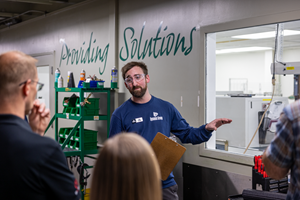Wood on Plastics - Electronics Remain a Growth Leader
The growth rate for the U.S. electronics industry decelerated during the second half of 2010. Growth was still positive, and it was certainly better than for other types of durable goods,
The growth rate for the U.S. electronics industry decelerated during the second half of 2010. Growth was still positive, and it was
certainly better than for other types of durable goods, but the rate of expansion slowed along with the cooling in the pace of the overall U.S. recovery.
Growth in the electronics industry is affected by the activity in the whole economy and in the major end-markets, but recent history shows that this industry’s growth increases at a higher rate during the cyclical highs, and doesn’t fall as far during the cyclical lows, compared with the rates for the total industrial sector.
This is the very definition of a “growth” industry, and the technology sector will remain one of the economy’s brightest patches for the foreseeable future. Levels of demand for many segments of electronics now exceed those seen before the recession, making this one of the few industries to have fully recovered and entered into the next phase of expansion. A strengthening U.S. economy will spur a re-acceleration in production of electronic products in 2011 and 2012. Our latest forecast calls for a gain of 6% to 8% in overall demand for electronic products.
Much of the attention in this industry is focused on consumer electronics (TVs, computers, smart phones, etc.), and here the outlook is very bright. While consumers have been reluctant to spend for many types of products, industrial output and retail sales of consumer electronics both have experienced solid growth. This indicates that the consumer electronics market remains in a rapid-evolution phase, and manufacturers are under tremendous competitive pressure to be first to market with unique and differentiated products.
A successful product in the consumer market quickly attracts copycat products from the competition, which results in rapid price erosion. To stay ahead of the competition, consumer manufacturers are continually forced to enhance their products or support emerging technologies. That leads to a sharp reduction in the consumer-product life cycle. These pressures favor plastics processors and other suppliers who can adjust quickly to changes in design, materials, and price pressures.
And while the consumer sector will continue to grab most of the headlines, the two main reasons for robust growth in electronics are: 1) electronic components continue to penetrate all segments of manufactured products; and 2) strong export demand. U.S. output of products such as testing devices, medical devices, automotive, appliances, and security systems will enjoy solid growth next year and beyond, but the rates of increase in both the number of units and the value of the electronic components that go into these goods will be even stronger.
So the outlook for the U.S. electronics market in 2011 and beyond is quite good, but the prospects for export markets are better. In fact, future growth for electronic products will be increasingly driven by demand in developing markets where rapid adoption of products such as mobile communication devices and consumer electronics continues at an accelerating pace. The global electronics industry will grow at an average rate above 7% during the next three years.
Design and early adoption of new electronic products will continue to be focused in the U.S. and Europe. However, the strongest growth for products that are first introduced in these two regions will more likely occur in Asia. One example is India, where demand for many types of consumer electronics is forecast at an annual average growth rate of 20% over the next three to five years.
WHAT IT MEANS TO YOU
- The market changes fast, as consumers tend to be fickle. Processors need to work with OEMs to enhance products or support emerging technologies such as connectivity and mobility.
- Environmentally sound disposal of outdated and broken electronics products will increasingly become an issue for processors and designers of these goods.
- The sources of materials used to manufacture electronics, and the ease with which these materials can be recycled, will also be increasingly important issues of which processors should be aware.
ABOUT THE AUTHOR
Bill Wood, an economist specializing in the plastics industry, heads up Mountaintop Economics & Research, Inc. in Greenfield, Mass. Contact BillWood@PlasticsEconomics.com.
Related Content
Medical Molder, Moldmaker Embraces Continuous Improvement
True to the adjective in its name, Dynamic Group has been characterized by constant change, activity and progress over its nearly five decades as a medical molder and moldmaker.
Read MoreImpacts of Auto’s Switch to Sustainability
Of all the trends you can see at NPE2024, this one is BIG. Not only is the auto industry transitioning to electrification but there are concerted efforts to modify the materials used, especially polymers, for interior applications.
Read MoreUS Merchants Makes its Mark in Injection Molding
In less than a decade in injection molding, US Merchants has acquired hundreds of machines spread across facilities in California, Texas, Virginia and Arizona, with even more growth coming.
Read MoreFor Extrusion and Injection-Blow Molders, Numerous Upgrades in Machines and Services
Uniloy is revising its machinery lines across the board and strengthening after-sales services in tooling maintenance, spare parts and tech service.
Read MoreRead Next
Lead the Conversation, Change the Conversation
Coverage of single-use plastics can be both misleading and demoralizing. Here are 10 tips for changing the perception of the plastics industry at your company and in your community.
Read MorePeople 4.0 – How to Get Buy-In from Your Staff for Industry 4.0 Systems
Implementing a production monitoring system as the foundation of a ‘smart factory’ is about integrating people with new technology as much as it is about integrating machines and computers. Here are tips from a company that has gone through the process.
Read More




















